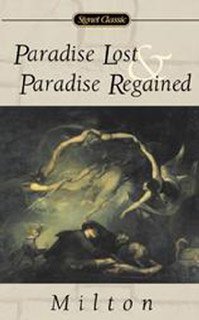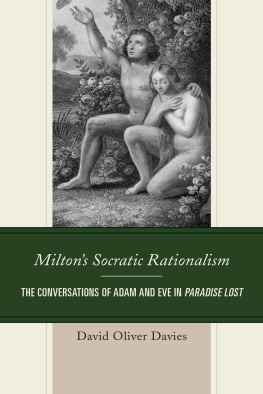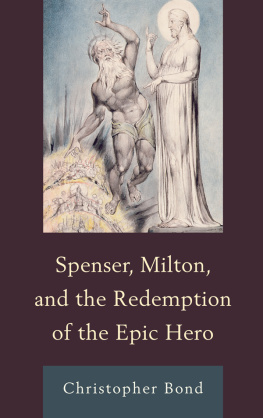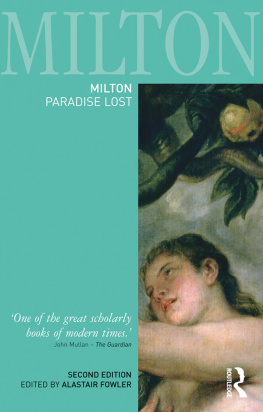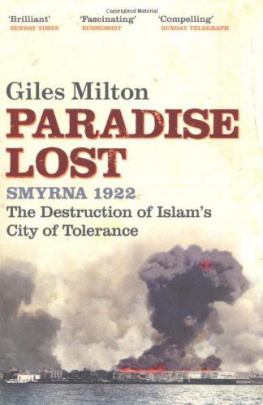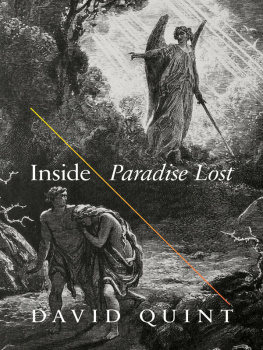William Poole - Milton and the Making of Paradise Lost
Here you can read online William Poole - Milton and the Making of Paradise Lost full text of the book (entire story) in english for free. Download pdf and epub, get meaning, cover and reviews about this ebook. publisher: Harvard University Press, genre: Detective and thriller. Description of the work, (preface) as well as reviews are available. Best literature library LitArk.com created for fans of good reading and offers a wide selection of genres:
Romance novel
Science fiction
Adventure
Detective
Science
History
Home and family
Prose
Art
Politics
Computer
Non-fiction
Religion
Business
Children
Humor
Choose a favorite category and find really read worthwhile books. Enjoy immersion in the world of imagination, feel the emotions of the characters or learn something new for yourself, make an fascinating discovery.

- Book:Milton and the Making of Paradise Lost
- Author:
- Publisher:Harvard University Press
- Genre:
- Rating:4 / 5
- Favourites:Add to favourites
- Your mark:
- 80
- 1
- 2
- 3
- 4
- 5
Milton and the Making of Paradise Lost: summary, description and annotation
We offer to read an annotation, description, summary or preface (depends on what the author of the book "Milton and the Making of Paradise Lost" wrote himself). If you haven't found the necessary information about the book — write in the comments, we will try to find it.
Milton and the Making of Paradise Lost — read online for free the complete book (whole text) full work
Below is the text of the book, divided by pages. System saving the place of the last page read, allows you to conveniently read the book "Milton and the Making of Paradise Lost" online for free, without having to search again every time where you left off. Put a bookmark, and you can go to the page where you finished reading at any time.
Font size:
Interval:
Bookmark:
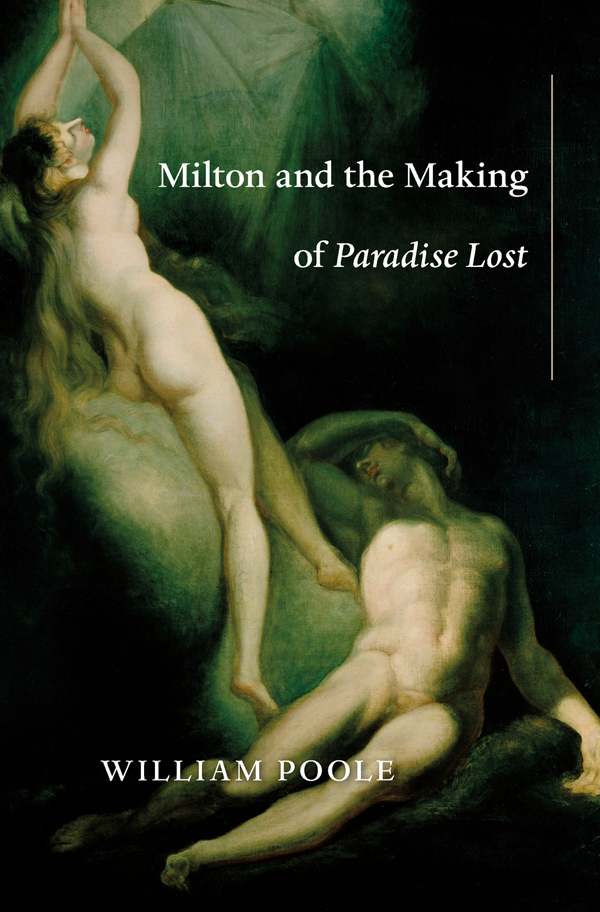
Milton and the Making of Paradise Lost

WILLIAM POOLE


Cambridge, Massachusetts
London, England
2017
Copyright 2017 by William Poole
All rights reserved
Jacket art: Art: The Creation of Eve, by Henry Fuseli, 17911793, courtesy of Bridgeman art (image #XKH146779)
Jacket design: Tim Jones
978-0-674-97107-3 (alk. paper)
978-0-674-98320-5 (EPUB)
978-0-674-98321-2 (MOBI)
978-0-674-98267-3 (PDF)
The Library of Congress has cataloged the printed edition as follows:
Names: Poole, William, 1977 author.
Title: Milton and the making of Paradise Lost / William Poole.
Description: Cambridge, Massachusetts : Harvard University Press, 2017. | Includes bibliographical references and index.
Identifiers: LCCN 2017011997
Subjects: LCSH: Milton, John, 16081674Biography. | Milton, John, 16081674. Paradise lostCriticism and interpretation.
Classification: LCC PR3581 .P64 2017 | DDC 821/.4 [B]dc23
LC record available at https://lccn.loc.gov/2017011997
For Zoe
I am now to examine Paradise Lost, a poem which, considered with respect to design, may claim the first place, and with respect to performance the second, among the productions of the human mind.
SAMUEL JOHNSON
A Reader of Milton must be Always upon Duty; he is Surrounded with Sense, it rises in every Line, every Word is to the Purpose; There are no Lazy Intervals, All has been Considerd, and Demands, and Merits Observation.
JONATHAN RICHARDSON
This book is an accessible introduction to and interpretation of the writing of the greatest single poem in the English language, John Miltons epic Paradise Lost (1667, second edition 1674). In offering an account of the making of Paradise Lost, this book is partly biographical and partly critical. Those interested predominantly in history may consider this something of a stealth biography, and may accordingly regret that I spend comparatively little time addressing, say, Miltons public, political life as an employee of successive interregnum regimes. On the other hand, those who seek a complete reading of Miltons poetry may miss a sustained analysis of, say, Samson Agonistes or Paradise Regained. I can only hope that the biography-of-a-poem hybrid that I have attempted possesses its own kind of coherence, and indeed that my manner of tying biographical concerns so closely to literary production will, after all, help to illuminate what an extraordinary achievement Miltons Paradise Lost is. I have also essayed in several chapters and an appendix to provide what are in effect reference guides to certain topics, notably Miltons known syllabus as a teacher, his theology, the evolution of his dramatic drafts, and the intricacies of the publication process of Paradise Lost. Some of these are rather technical, but then Milton was a technical man.
The particular focus of this study is on Milton as a reader and scholar, and indeed on how much of this scholarship was provoked and enhanced by his occupation as a teacher. To this extent my approach is, in Part 1, Milton, more scholarly than critical, but Mercury can only speak with authority when Minerva speaks with him. Nevertheless, Part 2, Paradise Lost, I hope, becomes increasingly critical as I lead the reader into some of the complexities of Paradise Losts internal construction and interpretation. For me Milton is above all a late, perhaps even a belated, humanist, but one with pronounced Hellenistic (he would perhaps have said Alexandrian) tastes, and a scholar who, sensitive to the times, and led on by his own massive self-esteema compound seemingly coined by Milton himselfdrew some markedly radical conclusions from his reading. I have also tried to deal with the literary impact of some practical problems for Milton, most profoundly the total blindness to which he succumbed in 1652. That, to me, is the emotional core of this book. Conversely, I have only tangentially engaged with the politics of Paradise Lost, a notoriously inconclusive venture, not because I deny the political dimension of this poem or indeed of Miltons life as a poet, but simply because it has been done to death and it is time now to vary our critical accents. For the same reason I have tried to deviate from some of the more well-trod routes up the Miltonic mountain, stepping round Miltons Maske and his pastoral elegy Lycidas, and providing instead a slightly more unusual route through his shorter poems.
Finally, it may be objected that to treat Miltons intellectual development as preparation for his great epic is Procrustean, Whiggish, and slavishly influenced by how Milton himself directed us to appraise his development. To this I answer that were this truly a biography, these criticisms would hit home. But my intention is to explain the genesis of a poem and how its writer came to be in a position to write it. I start and conclude this project, that is to say, with a conviction that the poem is paramount, and if I have managed to persuade readers not so well acquainted with Paradise Lost that it would be a good thing to become more so, I shall have succeeded. In short, I have tried hard not to speak solely to the community of experts.
This book was written in the summer vacation of 2016, but it is informed by some longer-term research, especially for my forthcoming editions of Miltons commonplace book and that section of the Trinity College manuscript in which Milton noted down dozens of ideas for prospective dramas. I have also relied on the research done for a few previous publications of my own; in particular the section on Miltons theology revisits themes developed in an earlier piece on Miltons Theology.
As befits this kind of book, I havewith mixed successtried to curb my references, although I have been free with bibliographical information in the chapters closest to reference guides. I am painfully aware that the more general the book on the more major the writer, the more one ends up repeating ones more talented colleagues, often unawares. I would, however, like to acknowledge here the debt all writers on Paradise Lost continue to owe to Alastair Fowlers superb annotations for his Longman edition. Over the last several years, I have been deeply influenced by my friend Nicholas McDowells ability to get Miltonic poetry and biography talking to one another, and I would also like to express my admiration for the criticism of John Leonard, David Quint, and John Rumrich. Rumrich in particular has done me several good turns now. I have relied heavily on the biographical tradition, most recently and notably Gordon Campbell and Tom Cornss John Milton: Life, Work, and Thought (2008), a work of great acumen, although I prefer Jeffrey Millers recent restatement of the young Miltons religiopolitical milieu as that of a conformable puritan.
Six friendly experts read parts or all of this manuscript at short notice. Thus I am deeply indebted for comments furnished by Gordon Campbell, Tom Corns, Edward Jones, and Nigel Smith; and I am especially fortunate to have had the whole text poked and prodded in almost medical detail by Zoe Hawkins and Jeffrey Miller. My readers for Harvard University Press produced unusually useful reports, for which I am also most grateful. Among the publishers, Mark Richards first suggested the project, and at Harvard, I thank my sympathetic editor, John Kulka, for allowing me to write this book when I had promised him a different one.
Font size:
Interval:
Bookmark:
Similar books «Milton and the Making of Paradise Lost»
Look at similar books to Milton and the Making of Paradise Lost. We have selected literature similar in name and meaning in the hope of providing readers with more options to find new, interesting, not yet read works.
Discussion, reviews of the book Milton and the Making of Paradise Lost and just readers' own opinions. Leave your comments, write what you think about the work, its meaning or the main characters. Specify what exactly you liked and what you didn't like, and why you think so.

